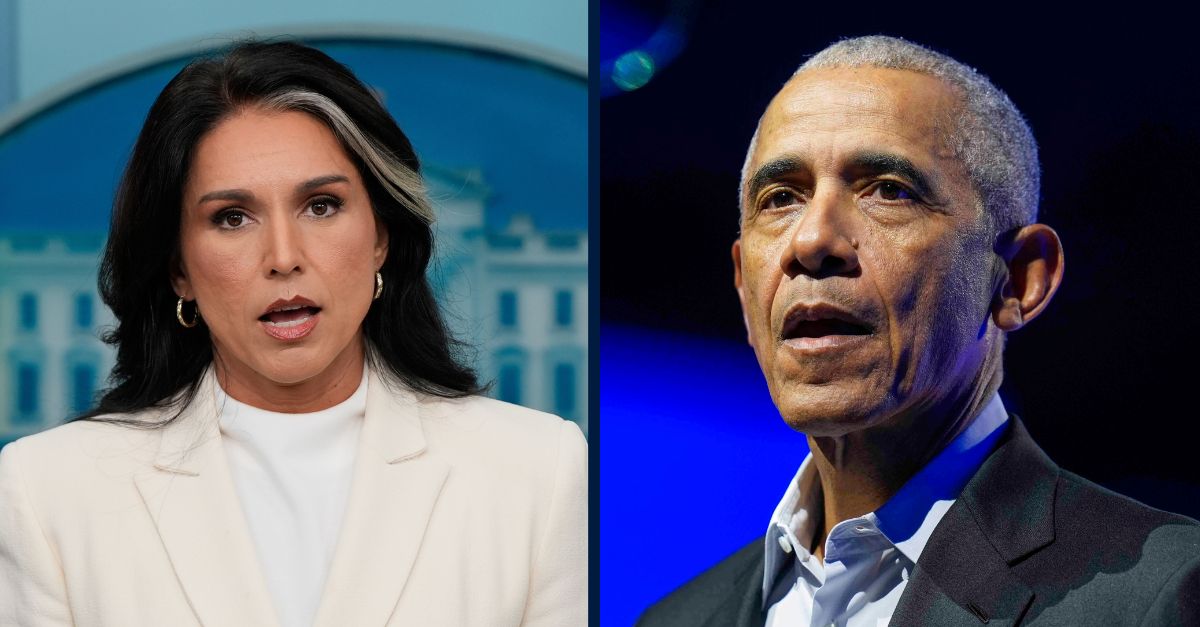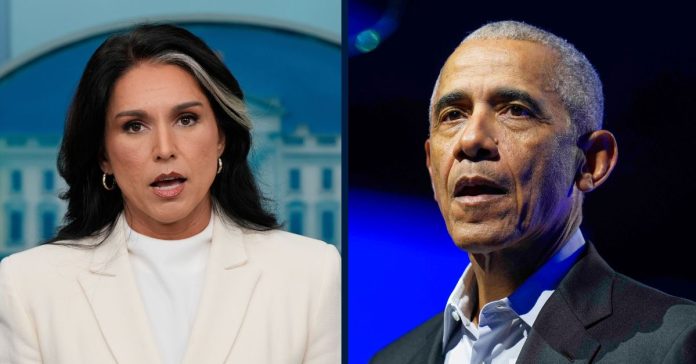
Left: Director of National Intelligence Tulsi Gabbard speaks with reporters in the James Brady Press Briefing Room at the White House, Wednesday, July 23, 2025, in Washington (AP Photo/Julia Demaree Nikhinson). Right: Former President Barack Obama speaks at the Obama Foundation Democracy Forum, Dec. 5, 2024, in Chicago (AP Photo/Erin Hooley, File).
Director of National Intelligence Tulsi Gabbard has now joined the ranks of President Donald Trump and certain allies in loosely accusing political opponents, this time former President Barack Obama and Obama administration officials, of committing a crime punishable by death, namely treason. No matter what Gabbard”s stated criminal referral to the DOJ may entail, it can’t be for treason or a “treasonous conspiracy,” as she put it, and there’s a simple way to know that is true.
Over the years, Law&Crime has covered instances where Trump, Rudy Giuliani, and many others have haphazardly used the term treason — and in the time since, not one treason prosecution has been brought. Nor did special counsel John Durham’s investigation of the Russia investigation’s origins and “Obamagate” lead to the mass jailings of powerful Democrats, including Obama and Joe Biden, that the president’s allies and supporters had long hoped for.
Yet, DNI Gabbard spoke at a press briefing on Wednesday and — while not as bold as Trump’s statements that Obama was “caught directly,” is “guilty” and committed “treason” — nonetheless straightforwardly levied a “treasonous conspiracy” allegation.
“I’m leaving the criminal charges to the Department of Justice. I am not an attorney, but as I’ve said previously, when you look at the intent behind creating a fake manufactured intelligence document that directly contradicts multiple assessments that were created by the intelligence community,” she said, “the expressed intent and what followed afterward can only be described as a years-long coup and a treasonous conspiracy against the American people, our republic, and an attempt to undermine President Trump’s administration.”
Love true crime? Sign up for our newsletter, The Law&Crime Docket, to get the latest real-life crime stories delivered right to your inbox.
But be clear, the focus of this piece is not on whether there’s any merit to Gabbard’s alternate history of Russian efforts to interfere in the 2016 election, the Senate Intelligence Committee’s bipartisan consensus about that interference and “efforts to influence the Trump Campaign and the 2016 election,” the Mueller probe, or even about Gabbard’s overarching narrative that the Obama administration and its officials “manufactured and politicized intelligence to lay the groundwork for what was essentially a years-long coup against President Trump” during his first term.
Rather, let’s talk about treason, which happens to be the only crime defined in the U.S. Constitution, under Article III, Section 3.
The Constitution is clear that treason is “only” an offense in the context of aiding and comforting enemies of the U.S. during war.
“Treason against the United States, shall consist only in levying War against them, or in adhering to their Enemies, giving them Aid and Comfort,” the law of the land reads. “No Person shall be convicted of Treason unless on the Testimony of two Witnesses to the same overt Act, or on Confession in open Court.”
18 U.S.C. § 2381, using virtually the same language, additionally notes that treason is a capital offense, again for one who, despite “owing allegiance to the United States, levies war against them or adheres to their enemies, giving them aid and comfort within the United States or elsewhere[.]”
The punishment is not only a potential death sentence, but short of that, “not less than five years” in prison, at least a $10,000 fine, and a ban from “holding any office under the United States.”
Whatever you think Obama and the officials in his administration did in 2016, before Trump took office, they are not foreign powers and there was no act of war under the meaning of the Constitution — therefore, treason did not occur.
Attorney General Bill Barr, during an interview on CNN in 2020, articulated the correct legal view of the term treason when asked about Trump’s “spying” accusations against former President Obama and former Vice President Joe Biden.
Trump had said, in part, “Look, we caught the Obama administration spying on our campaign. They spied on our campaign. That’s treason. That’s treason. If this were the other way around, and it was Democrats instead of Republicans, there’d be people — many people would be in jail already.”
“But the bottom line is: We caught President Obama and Sleepy Joe spying on our campaign. That’s treason. That’s illegal,” he added.
CNN’s Wolf Blitzer asked Barr if it was appropriate for Trump to be “accusing his predecessor, President Obama, and former Vice President Biden of committing treason?”
“Well, treason is a legal term. I think he’s using it colloquially,” Barr replied, then and there throwing cold water on anyone believing that treason prosecutions were a real possibility.
“You have to have a state of war with a foreign enemy to commit treason,” Barr continued. “But I think he feels they were involved in an injustice. And if he feels that, he can say it.”
Why Gabbard would say it, misleading the president’s supporters along the way, is another story.
An Obama spokesperson said the “bizarre” claims, though “ridiculous and a weak attempt at distraction,” were “outrageous enough to merit” a response this time.
“Nothing in the document issued last week undercuts the widely accepted conclusion that Russia worked to influence the 2016 presidential election but did not successfully manipulate any votes,” said Patrick Rodenbush. “These findings were affirmed in a 2020 report by the bipartisan Senate Intelligence Committee, led by then-Chairman Marco Rubio.”
However, in the wildly unlikely scenario where Trump’s DOJ actually did purport to bring treason charges against Obama, it would do the Justice Department well to read up on a certain Supreme Court case granting presumptive immunity to official acts of the president.

